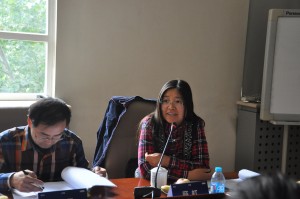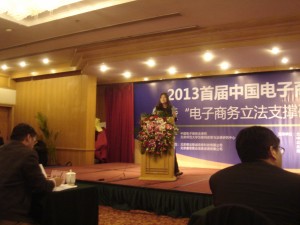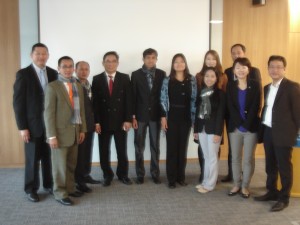Chinese Multi-Stakeholder Meeting on IANA Transition ICANN政策中文社群研讨会
 2014年5月5日,由北京师范大学互联网政策与法律研究中心、互联网域名系统北京市工程研究中心(ZDNS)、下一代互联网关键技术与评测北京市工程研究中心(BII)联合主办的“ICANN政策中文社群研讨会”在北京召开。本次会议主题聚焦当前ICANN发布的IANA管理权过渡实施草案热门话题,ICANN北京合作中心主任宋崝,域名工程中心主任、中网董事长毛伟,下一代互联网关键技术与评测北京市工程研究中心主任、天地互联总裁刘东,北京师范大学法学院政策与法律研究中心主任薛虹教授,以及来自工业和信息化部、中国互联网协会、CNNIC、APNIC、IEEE、黄道科技等政府主管部门、行业组织、域名注册管理机构的领导、专家出席本次会议,就IANA管理权移交实施方案进行了深入研讨。
2014年5月5日,由北京师范大学互联网政策与法律研究中心、互联网域名系统北京市工程研究中心(ZDNS)、下一代互联网关键技术与评测北京市工程研究中心(BII)联合主办的“ICANN政策中文社群研讨会”在北京召开。本次会议主题聚焦当前ICANN发布的IANA管理权过渡实施草案热门话题,ICANN北京合作中心主任宋崝,域名工程中心主任、中网董事长毛伟,下一代互联网关键技术与评测北京市工程研究中心主任、天地互联总裁刘东,北京师范大学法学院政策与法律研究中心主任薛虹教授,以及来自工业和信息化部、中国互联网协会、CNNIC、APNIC、IEEE、黄道科技等政府主管部门、行业组织、域名注册管理机构的领导、专家出席本次会议,就IANA管理权移交实施方案进行了深入研讨。
互联网域名系统北京市工程研究中心主任、中网公司董事长毛伟先生和下一代互联网关键技术和评测北京市工程研究中心主任、天地互联公司董事长刘东先生发表了欢迎致辞,就本次研讨会的背景和目做了简要介绍。
北京师范大学互联网政策与法律研究中心主任薛虹教授就IANA管理权过度实施方案的背景、最新进展以及潜在影响做了介绍:2014年3月14日,美国国家电信和信息管理局(NTIA)宣布有意将IANA(互联网域名根服务器管理的关键职能)管理权移交至全球多利益相关方社群。NTIA请求ICANN作为IANA职能运营者和全球域名系统协调人,召集多利益相关方来制定一套移交提案,该移交提案必须获得广泛的社群支持。接着,薛虹教授就IANA管理权过渡实施方案提出了自己的真知灼见:1、多数专家赞成IANA管理权适用多利益相关方的模式来解决,但多利益相关方的范围和定义值得我们探讨。2、要着重考虑中文社区的利益,在IANA管理权过渡移交过程的主张中国的话语权;对于在直接使用IANA,IETF和IRI等的中文社区是非常重要的参与方,要予以关注。3、我们要继续发展和完善多利益相关方的对话机制,考虑互联网的未来发展。4、中国在互联网发展中有举足轻重的地位,我们要很谨慎的设定自己的立场。5针对ICANN运营IANA职能的监管问责体系要确立。
此外,中国互联网协会曹华平博士、域名工程中心实验室主任马迪博士、下一代互联网关键技术及评测北京市工程研究中心宋林健博士等也纷纷发言,对此提出各自的见解。
互联网域名系统北京市工程研究中心主任、中网公司董事长毛伟先生总结时表示,在多利益主体模式下,中国互联网社群其实大有可为。中文社群应该多做贡献,多做人才储备,才能在国际舞台上有更多角色以及更大的话语权。中文社群也要多举办诸如本次的此类会议,集合多方的意见和建议,向ICANN提交相关提案,发出自己的声音,参与互联网规则制定。
The Consensus Statement formed at the Meeting has been submitted to ICANN.
Issue: Draft Proposal, Based on Initial Community Feedback, of the Principles and Mechanisms and the Process to Develop a Proposal to Transition NTIA’s Stewardship of the IANA Functions.
Date: 6 May 2014
Public Comment Announcement URL:
In response to the ICANN’s call for the Public Comment on Transition of Stewardship of IANA, Internet Domain Name System Beijing Engineering Research Center (ZDNS), Beijing Internet Institution (BII) and Beijing Normal University Institute for Internet Policy & Law (IIPL) hosted a Chinese Internet Community multi-stakeholder meeting on May 5th, where technical community, TLD registries, civil society, academic, private sector, and government and other stakeholders came together to discuss the views of Chinese community on the principles, mechanisms and processes of the transition as well as the ICANN recently published proposal on IANA Transition.
Based on the input and opinions from experts, scholars and representatives from relevant parties and organizations at the meeting, our comments may be summarized as follows:
- Comments on the proposed multi-stakeholder model of transition
- Comments on Involvement of the Global Communities
- Comments on Mechanisms to ensure Accountability
Comments on the proposed multi-stakeholder model of transition
We strongly agree to the proposed multi-stakeholder model of transition, which shall optimize the Internet governance. However, we do think the model should be more specific, including who exactly the stakeholders are; the whole structure of the multi-stakeholder; if government is eligible to participate, to what extent can it be involved; if Internet companies are eligible to participated and have the right to input; how many members will the multi-stakeholder be; if they can represent the interest of majority of Internet community; what the decision–making process will be, by voting or any other way. The outline of the multi-stakeholder model is expected to be published soon.
Comments on Involvement of the Global Communities
Under current governance model of ICANN, representatives from developed countries are the majority, which is theoretically against the openness of the Internet. We strongly suggest that regional balance and diversity should be enhanced by creating new process and mechanism to involve more relevant governors, representatives from different communities. Besides, customized communication channels should also be provided for experts, scholars and representatives to deliver their opinions to the new takeover party of current IANA functions, so that relevant parties can participate in the whole process of decision making. What’s more, the members of IANA function transition steering group should include more representatives from Asia-pacific region. With respect to Chinese Internet community, we do call ICANN’s special attention that more and more direct customers and partners of IANA function (e.g. hundreds of new gTLD registries) are emerging and are worthy ICANN of more effective engagement efforts and participation opportunities.
Comments on Mechanisms to ensure Accountability
If the key Internet domain name functions are going to be transferred to ICANN, the transition should begin with clarification of the NTIA’s oversight role that it’s been playing. Corresponding accountability mechanism should be established profoundly so that ICANN is able to function properly and serve the whole Internet community. Concerning the unpredictable issues that may arise, an accountability mechanism is imperative to supervise ICANN and urge ICANN to make amendments and adjustments. Therefore, a sound and responsible accountability mechanism should be put in place during the process of transition to prevent any disorder of key Internet domain name functions. Instead of conducting the badly needed reform and improvement of accountability system in a parallel and separate process, we do call ICANN to effectively integrate the accountability mechanism with the transition of stewardship of IANA function.
Conclusion
Based on discussion, relevant representatives and parties have come to the comments above. We do hope they can be taken into account by NTIA to work out a more reasonable and efficient transition proposal.
Names of Participants in the Comment Developing Process :
Beijing Internet Institute and Beijing Normal University Institute for Internet Policy & Law (IIPL) (Prof. Hong Xue)
InternetDomainNameSystemBeijingEngineeringResearchCenter(ZDNS)(Director General, Mao Wei)
BeijingInternet Institution (BII)(Director General, Liu Dong)
Internet Society ofChina(Doctor Cao Huaping)
Beijing University of Posts and Telecommunications ( APNIC executive Member, Prof Ma Yan)
Tsinghua University (IETF IPv6 Excess Workshop Chairman, Prof Cui Yong)
Internet International Affairs Counselor (Doctor Zhang Jianchuan)
IEEE (Director of APAC, Hua Ning)
CNNIC( Internet Policy Research Managers, Han Liyun & Zhu Cong)
Zodiac Registry ( Internet Policy Expert, Tan Yaling)
Permalink Comments off







